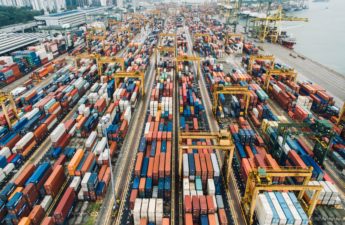Freights
Services
Tia

The Power of Data: Machine Learning is Driving the Biggest Breakthroughs in Freight
Post on August 29, 2019

Why data is important for making freight efficient and effective
- Even a mid-sized freight company is likely to be operating dozens of trucks, which translates into several million kilometres covered every year. Traditionally, freight companies would rely on the expertise of their most experienced teams to ensure smooth operations. Humans haven’t done that bad, but research studies reveal that there’s plenty of scope for further improvements. This is where data can be useful in helping freight companies to achieve optimal efficiency and effectiveness in their operations.
How to use data to improve freight management
- With compact, advanced hardware and wireless technology, data can be easily collected through various sources and processed through machine learning algorithms. This will provide freight managers with a more realistic view of ground operations and allow them to make informed decisions. This, in turn, will boost freight efficiency and effectiveness. For example, transport vehicles are now being equipped with GPS and M2M (machine to machine) eSIM, which can be used to track the vehicle in real-time and download a range of data about driving patterns and vehicle health. AI and machine learning can process this data further to provide insights and alerts about possible future outcomes.
Cognitive functions
- Advanced AI now comes with cognitive functions, which has proved immensely useful for freight companies. Thousands of documents need to be processed each day, which is quite a challenge if done manually. Moreover, there’s always the possibility of human error and oversight. With AI-based cognitive functions, freight companies can automate document scanning and processing. This saves time, money and effort, all while improving accuracy in document processing. AI-based cognitive algorithms can also be programmed to detect patterns by comparing new data with previously inputted data. This has been very useful in identifying errors as well as raising red flags for potential frauds.
Deep learning
- This is an integral part of machine learning and the closest we have gotten to mimic the neural networks of the brain. Deep learning can aggregate data from various sources and process it to derive meaningful results. For example, deep learning can analyze a vehicle’s history and predict when it’s most likely to experience a breakdown. These and various other predictive outputs enabled by deep learning can be very useful for freight managers to take proactive decisions.
- Freight companies that want to grow and boost their competitiveness will have to harness the power of data through AI and machine learning. By utilizing power AI and machine learning, even smaller freight businesses can give tough competition to bigger players in the industry. By unlocking the power of data, freight companies can improve their efficiency, reduce costs, and minimize guesswork and human errors. With an efficient fleet, freight companies will also be reducing their carbon footprint, thereby helping the cause of environmental conservation.
Recent Post
- Freight Dictionary: Words Beginning from Letter E
- Turn Passive Data into Targeted Business Intelligence
- Transportation Management Trends— Why Developing Scalable Tech is the Need of the Hour
- Safe and Sound: Why Security of Freight Interfaces Matters?
- Freight Dictionary – Words Beginning From Letter D


